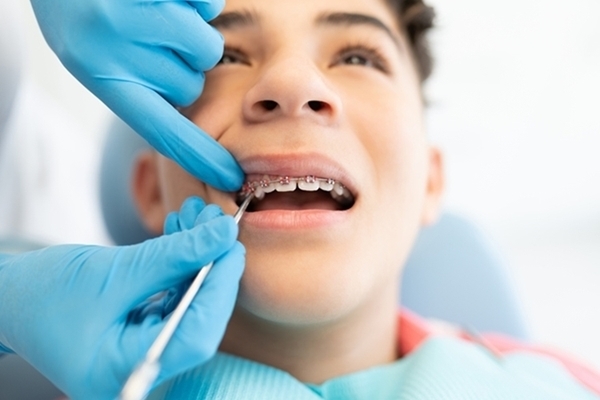Monthly Archives: August 2020
-
Effective Oral Hygiene for Orthodontic Patients
Author: Website AdminCategories: OrthodonticsDr. Hemant Patel, Principal Orthodontist at Liverpool Brace Place, BDS, Mo. Orth, RCS (ed), M Orth RCS (Eng), MRCPS (Glas).
Maintaining good oral hygiene is a particular challenge for patients with fixed orthodontic appliances. The presence of brackets, wires and bands make it particularly difficult to clean thoroughly and as a result it is common for plaque to accumulate on the buccal surface around the base of the bracket. Retained plaque represents a considerable clinical risk that demineralisation of the enamel will occur, resulting in white spot lesions. The development of gingivitis and hyperplastic gingival is also a well recognised problem during orthodontic treatment with fixed appliances. As an orthodontist who sees his patients once every 4-6 weeks I am unable to fully monitor patient’s oral hygiene on a daily basis, as such we go to great lengths to stress to all our patients the importance of maintaining a comprehensive daily oral care regime. This is a particular
-
5 irritating things to expect from your fixed braces
Author: Website AdminCategories: OrthodonticsSome people would say vanity is a sin, and sins don't come without something to make you wish you hadn't veered from the path of righteousness. Whether you're having braces fitted for cosmetic reasons or because your bite's awkward, you're likely to experience some issues. Everyone experiences orthodontic treatment differently. Some people have naturally mobile teeth, or a higher pain threshold, but let's highlight the main things you can expect from your fixed braces.
1. Discomfort
Yes, I'm afraid so! Most people will experience some discomfort in the first week or two. Like those awful dreams in which you take a wrong footing and your teeth fall out into the palm of your hand, your teeth may feel like they're being forced out of place – which, of course, they are! Try taking paracetamol or ibuprofen to help dull the sensation.2. Sores and ulcers
Some people are more prone to mouth ulcers than others. You'll find that parts -
Oral Care Needs For People With Autism
Author: Website AdminCategories: Oral HygieneIt is not unusual for parents and carers responsible for the day to day care of autistic children and adults to find it difficult to encourage the person with autism to clean their own teeth and mouth. Equally delivering this care can be even more difficult.
It is essential that mouth care is delivered. The obvious reason for this is to maintain good hygiene and quality of life. It is also considered a form of abuse if oral care is neglected and you are the carer (Department of Health ‘No secrets’ publication).
Trust plays a major role in co-operation and compliancy with mouth care. Give plenty of time and room when care is provided. There is no law to say when mouth care should be delivered, so wait until they are ready or in the right mood for the delivery of care – but don’t break a routine if you know it works for them. Use your knowledge of the individual to assess when or where is a good time for them to be relaxed about mouth care.
Every
-
What are the causes of bad breath?
Author: Website AdminCategories: Oral HygieneWhile it is possible for bad breath to emanate from the stomach and the lungs it is in the majority of cases attributable to the mouth or oral cavity. In the mouth there are over 700 different types of bacteria, constantly multiplying to numbers in the millions. Plaque or dental biofilm is the sticky colourless substance that is formed when these bacteria combine with food debris trapped in between the teeth and gums. Bacteria feed on and decompose these food particles resulting in the release of a number of odour emitting gases, the cause of the nasty smell. It stands to reason that the more biofilm, the more bacterial activity and the greater the volume of gases produced. Therefore individuals with poor oral hygiene, gum disease or simply a higher genetic predisposition to plaque are more likely to suffer from bad breath. What is ‘morning breath’? While we sleep our saliva glands produce significantly lower levels of saliva then during waking hours. The dry mouth effect
-
Top 10 tips for preventing dental problems in babies
Author: Website AdminCategories: ChildrenAs Benjamin Franklin once said, “An ounce of prevention is worth a pound of cure”. So, give your baby’s teeth the best possible chance and follow these tips for preventing dental problems:
- Visit the dentist
Take babies for a dental check-up during their first year. This gives your dentist a chance to spot any potential problems and advise you about how to protect your child’s teeth. Familiarising babies with their dental practice will also help to prevent any anxiety about future vists. - Start brushing
Dentists recommend that you start cleaning babies’ teeth with an infant toothbrush twice daily as soon as their first tooth begins to emerge. Starting early gets babies accustomed to brushing, thereby avoiding problems later on. Check fluoride levels when choosing an infant toothpaste; under-threes need low-fluoride toothpaste with 1000ppm of fluoride. Your dentist or hygienist
- Visit the dentist
-
What is Zinc Poisoning?
Author: Website AdminCategories: DenturesPeople who wear dentures and use denture adhesives need to be aware of a possible complication concerning the amounts of zinc in the preparations of these adhesives. Although zinc is an important trace mineral and an essential part of a healthy diet, as it helps the immune system, too much zinc can be dangerous. Having high levels of zinc in your system can be toxic but it can also lead to low amounts of copper in your body. Copper is important because it is necessary to maintain healthy bones and connective tissue. Low levels of copper can lead to suppression of the bone marrow, and slow degeneration of the spinal cord. The result of this can be crippling nerve damage.
The link between zinc poisoning and denture adhesives only became apparent when cases of people who had developed difficulty walking, and weakness in the limbs were investigated. They were found to have very low levels of copper in their systems and doctors soon realised that this was due to zinc poisoning, but how
- Page Previous
- Page 1
- You're currently reading page 2







